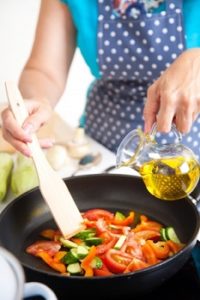 Simple, clean eating is a definitive component of a detoxification diet. As you cut out processed and packaged foods which essentially have excess everything – salt, fat, sugar, carbs – and start to consume healthy, whole vegetables, fruits, lean meats, organic dairy products, eggs, and whole grains, your body goes through a transformation and is kicked into detox mode.
Simple, clean eating is a definitive component of a detoxification diet. As you cut out processed and packaged foods which essentially have excess everything – salt, fat, sugar, carbs – and start to consume healthy, whole vegetables, fruits, lean meats, organic dairy products, eggs, and whole grains, your body goes through a transformation and is kicked into detox mode.
More energy, greater mental clarity, and a higher functioning immune and filtration system helps eliminate built up waste byproducts, toxins, and other harmful biochemical agents which fuel harmful free radicals in the body.
A critical step in the detoxification diet process is prioritizing preparing your own food, versus buying it at the store, from a vending machine, or in a restaurant. When you prepare your own food, you:
• Have more control over the ingredients
• Feel pride and ownership over what you’re putting in your body
• Make healthier choices
• Educate yourself on pairings, flavorings, and technique
• Avoid cravings and impulse purchases
• Combat poor digestion and other toxin-induced ailments
Have you ever stopped to think about the potential toxins which may be in the very pots, pans, and other kitchen items you are using to prepare and store your food? When it comes to a detoxification diet, give your kitchen a quick audit for these common toxic cooking instruments and utensils:
BPA (Bisphenol A)
You may have noticed more and more “BPA Free” labels on the items you buy for your home and children lately – from baby bottles, canned food, and sports equipment to plastic containers and piping. Are you wondering, what’s with the new market abandonment of BPA?
While Bisphenol A is actually an organic chemical compound utilized in the manufacturing of many common household items as well as certain industrial resins and plastics, scientific research has discovered it may interact negatively with the human body. Referred to as an “endocrine disrupting chemical”, BPA has been shown to mimic naturally occurring hormones, like estrogen. The potential for adversely affecting healthy reproductive, neurological, and developmental processes in the body has been cause for alarm across much of the world’s medical community.
Related reading: How to Detox Environmental Estrogen to prevent Estrogen Dominance
Even though more scientific research is needed to support many claims about BPA’s negative impact on public health, the U.S. in addition to Canada and the European Union have already banned its use in baby bottles.
Non-stick Pans (Teflon)
Ever wondered if the whisperings about teflon were true? From “teflon makes you sick” to “teflon causes cancer,” the rumor mill has circulated many a time over when it comes to the subject of teflon. Scientifically speaking, Teflon can indeed make you sick, but only if you cook in pans coated with it at temperatures over 500 degrees Fahrenheit, which most household burners rarely get up to.
Teflon was introduced more commercially around the 1960s as a synthetic resin (polytetrafluoroethylene) which prevented particles from sticking to pretty much everything – cookware, catheters, machinery, the list goes on. While at lower temperatures, the chemical compounds in teflon are stable, as the heat rises, they can actually break down and begin to decompose.
When this happens, fluorocarbon gases are released which have been shown to be fatal to some birds and result in flu-like symptoms in humans. Symptoms of “Teflon Flu” (or Polymer fume fever) include chills, headache, cough, fever, and possibly even excess fluid in the lungs. Best practice is to avoid extremely high cooking temperatures when using teflon coated pots and pans, and also to use non-metal utensils on the dishes themselves to avoid scraping off bits of nonstick coating into your food.
Aluminum
Giving your tomatoes a quick roast in the oven at high heat on a sheet of aluminum foil? While it certainly makes cleanup easier, you might want to rethink your method. Turns out that unlike most aluminum pots and pans, aluminum foil is not typically oxidized, which means that at high temperatures and with super acidic foods (tomatoes, lemons, etc), it can start to break down and seep into your food.
Sure you ingest, inhale, and absorb aluminum daily without even realizing it – it’s in a ton of stuff from deodorant to antacids, metal water bottles, canned food, pancake mix, treated water, astringents, tea, and much more. But high levels of aluminum, especially from cookware, can negatively affect people with kidney and bone diseases.
Minimal research has shown a correlation between aluminum exposure and some degenerative cognitive diseases like Alzheimer’s, but studies are needed to find a conclusive link between the two.
Being aware of toxins and how you can fuel your body to eliminate them plays an important role in your overall health and wellness as well as your detoxification diet. Don’t forget to be mindful of the external toxins in the everyday items and cookware you use as well!
Related reading: Is Your Detox System Overloaded With Every Day Toxic Chemicals?
Author bio: Jessica Hegg is the content manager at ViveHealth.com. Interested in all things related to living a healthy lifestyle she works to share valuable information aimed at overcoming obstacles and improving the quality of life for others.



